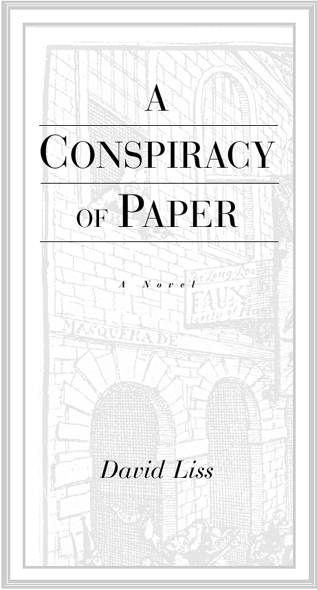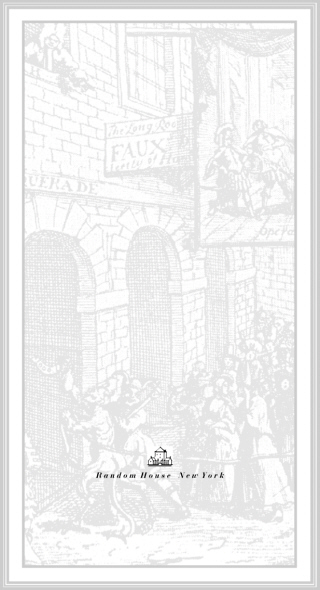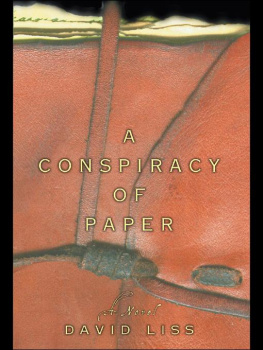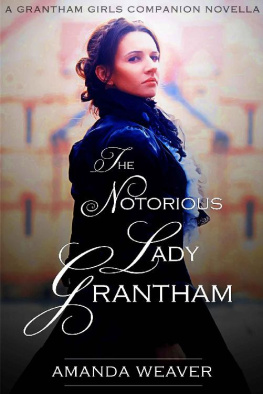

CONTENTS

ONE
F OR SOME YEARS NOW, the gentlemen of the book trade have pressed me in the most urgent fashion to commit my memoirs to paper; for, these men have argued, there are many who would gladly pay a few shillings to learn of the true and surprising adventures of my life. While it has been my practice to dismiss this idea with a casual wave of the hand, I cannot claim to have never seriously thought on it, for I have often been the first to congratulate myself on having seen and experienced so much, and many times have I gladly shared my stories with good company around a cleared dinner table. Nevertheless, there is a difference between tales told over a late-night bottle of claret and a book that any man anywhere can pick up and examine. Certainly I have taken pleasure from the idea of recounting my history, but I have also recognized that to publish would be a ticklish endeavorthe names and specifics of my adventures would touch nearly on so many people still living that any such book would be actionable to say the least. Yet the idea has intriguedeven plaguedme, no doubt due to the vanity that breeds within all mens breasts, and perhaps within mine more than most. I have therefore decided to write this book as I see fit. If the gentlemen of Grub Street wish to dash out names of obscure connections, then they may do so. For my part, I shall retain the manuscript so that there can be some true record of these events, if not for this age, then for posterity.
I have been at some pains to decide how to begin, for I have seen many things of interest to the general public. Shall I begin like the novelists, with my birth, or like the poets, in the midst of the action? Perhaps neither. I think I shall begin my tale with the daynow more than thirty-five years agowhen I met William Balfour, for it is the matter regarding his fathers death that brought me some small measure of success and recognition with the public. Until now, however, few men have known the whole truth behind that affair.
Mr. Balfour first called on me late one morning in October of 1719, a year of much turmoil upon this islandthe nation lived in constant fear of the French and their support for the heir to the deposed King James, whose Jacobitical followers threatened continually to retake the British monarchy. Our German King was but four years upon the throne, and the power struggles within his ministry created a feeling of chaos throughout the capital. All the newspapers decried the burden of the nations debt, which they said could never be paid, but that debt showed no sign of decreasing. This era was one of exuberance as well as turmoil, doom, and possibility. It was a fine time for a man whose livelihood depended upon crime and confusion.
Matters of national politics held little interest for me, however, and the only debt I cared for was my own. And the day I begin my tale I had even more pressing cares than my precarious finances. I had been long awake, but only recently out of bed and dressed, when my landlady, Mrs. Garrison, informed me that there was a Christian gentleman below who wished to see me. My good landlady always felt the need to specify that it was a Christian gentleman come to visit, though in the months I had resided with her, no Jew but myself had ever entered her premises.
That morning I found myself disordered and in no condition to receive visitors, let alone strangers, so I asked Mrs. Garrison to send him away, but in her intrepid mannerfor Mrs. Garrison was a stalwart creatureshe returned, informing me that the gentlemans business was urgent. He says it relates to a murder, she told me in the same dull tone she used to announce increases in my rent. Her pallid and beveined face hardened to show her displeasure. Thats what he saidmurderplain as anything. I cannot say it pleases me, Mr. Weaver, to have men come to my house talking of murder.
I could not fully comprehend why, if the word was so distasteful to her ears, she should pronounce it quite so loudly within the halls, but I saw my task was to comfort her. I quite understand, madam. The gentleman surely said mercer and not murder, I lied, for I am engaged in a concern of textiles at this moment. Please send him up.
The word murder had caught my attention as well as Mrs. Garrisons. Having been involved in a murder of sorts not twelve hours earlier, I thought this matter might concern me indeed. This Balfour would certainly be a scavenger of some kindthe sort of desperate renegado with which London seethed, a creature who combed the dank and filthy streets near the river, hunting for anything he might pawn, including information. No doubt he had heard something of the unfortunate adventure with which I had met and had come to ask me to pay for his silence. I knew well how to dispose of a man of this stripe. Not with money, certainly, for to give a rascal any silver at all was to encourage him to return for more. No, I had found that in these cases violence usually did my business. I would think of something bloodlesssomething that would not attract Mrs. Garrisons attention when I escorted the blackguard out. A woman with no taste for the talk of murder under her roof should hardly countenance an act of mutilation paraded down her staircase.
I took a moment to order my receiving room, as I called it. I took two rooms of Mrs. Garrison, one private, the other in which I conducted my business. Like many businessmenfor so I fancied myself, even thenI had been used to order my affairs in a local coffeehouse, but the delicate nature of my work had made such public venues unacceptable to the men I served. Instead, I had set up a room with several comfortable chairs, a table around which to sit, and a handsome set of shelves that I used to store wine and cheese rather than the books for which they were designed. Mrs. Garrison had done the decorating, and while she had given the room an inappropriately cheery tone with its pinkish-white paint and light blue curtains, I found that a few swords and martial prints about the walls helped to add a sufficiently manly corrective.
I took pride in these rooms being so very proper, for the genteel tone put the gentlemen who came to seek my services at ease. My trade frequently involved the unsavory, and gentlemen, I had learned, preferred the illusion that they dealt in simple businessnothing more.
I should like to add, though I risk accusations of vanity, I took pride in my own appearance as well. I had escaped my years as a pugilist with few of the badges that gave fellow-veterans of the ring the appearance of ruffiansmissing eyes, mashed noses, or suchlike disfigurementsand had no more to show for my beatings than some small scars about my face and a nose that bore only the mild bumps and jagged edges that come with several breakings. Indeed, I fancied myself a well-enough-looking man, and I made a point of always dressing neatly, if modestly. I wore upon my body only clean shirts, and none of my coats and waistcoats were more than a year old. Nevertheless, I was none of your sprightly popinjays who wore the latest bright colors and frills; a man of my trade always prefers simple fashions that draw to himself no particular attention.
I seated myself at my large oaken writing desk, which faced the door. I used this desk when I ordered my affairs, but I had discovered that it served to make clear my authority. I thus picked up a pen and contorted the muscles in my face to resemble something like a man both busy and irritated.
Next page














